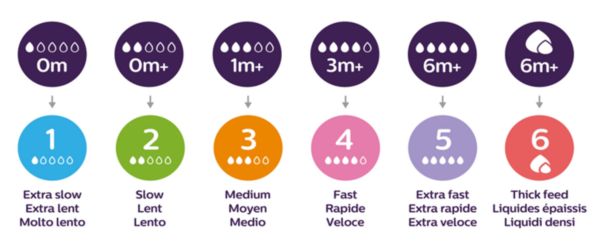Following your baby’s cues is the best approach when deciding to change the nipple to a different flow rate.
In general, as long as your baby is calm and comfortable while feeding and getting enough milk from the bottle, there is no need to change the nipple to a different flow rate. You also do not need to change to a higher flow rate nipple based on the baby’s age.
We recommend to start with the nipple that comes with the bottle and adjust from there. If you have no success after a few feeding attempts, change to a different nipple flow rate.
Use a nipple with a higher flow rate if:
- Your baby is not getting enough milk from the bottle or
- The duration of the feed is too long (for example, longer than 30 minutes) or
- Your baby falls asleep during feeding, gets frustrated, or plays with the nipple instead of drinking.
Use a nipple with a lower flow rate if:
- Your baby is gulping the milk down or
- Milk leaks out of its mouth during feeding.
The Natural Response nipples are available in flow rates from 1 to 5 in the United States and Canada and from 1 to 6 in other countries. Nipples with the highest flow rate 6 are more suitable for thicker liquids or babies who want a fast flow.

